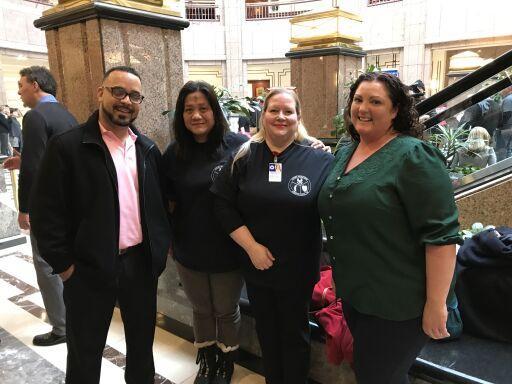2019 State Legislative Review
The General Assembly adjourned its regular 2019 legislative session June 5, providing Council 4 and the labor movement with an opportunity to reflect on significant accomplishments:
- Approval of a dozen state employee contracts, including the first contract for nearly 200 members of AFSCME Local 381 (Public Defenders) and a memorandum of understanding that accretes 125 newly organized Judicial Branch employees within AFSCME Local 749. Congratulations to the members of both unions, who did a great job contacting their legislators and urging support of the agreements.
- Passage of SB 164, which provides up to one year of workers compensation coverage for post traumatic stress syndrome to police officers, firefighters and parole officers. Passage of SB 164 is part of a long battle to restore PTSD coverage after Big Insurance cruelly stripped it from workers’ compensation statutes in 1993. The bill also includes a study on the feasibility of including correction officers and EMT workers in this legislation.
- Passage of HB 5004 which raises the minimum wage to $15 per hour by June 1, 2023 and indexes it to inflation beginning January 1, 2024. Thanks to the Connecticut AFL-CIO and the Fight for $15 CT coalition for their leadership in this campaign, which raises the wage floor for all workers. As the saying goes, “A rising tide lifts all boats.”
- Passage of SB 1, which creates the Family and Medical Leave Insurance (FMLI) program and will be staffed in part by members of our Local 269 at the Department of Labor, who organized against efforts to privatize FMLI administration. Connecticut’s FMLI will provide wage replacement benefits to employees taking up to 12 weeks of leave over a 12-month period for illness or injury, care of a family member or birth or adoption of a child.
Council 4 staff and members also successfully repelled some harmful attacks in full or part:
- Gov. Lamont’s proposal to cut cost of living adjustments (COLAs) for future state retirees. Working with the State Employee Bargaining Agent Coalition (SEBAC), Council 4 made it clear that our members have sacrificed repeatedly and substantially, including the 2017 concession agreement that provides $1.6 billion in savings in the current biennium, and $24 billion over 20 years.
- The state Judicial Branch sought but failed to privatize the work performed by court recording monitors in AFSCME Local 749. Kudos to our members who work in courthouses throughout the state and educated the public and the legislature about how privatization would harm the integrity of judicial proceedings. Their efforts compelled the Branch to agree to strip out the privatization language from SB 964, their omnibus operations bill.
- SB 882 (the Governor’s budget) included proposals for a dramatic increase in employee contributions to the Connecticut Municipal Employee Retirement System (CMERS) and changes to municipal binding arbitration that would further tip the scales toward management. We were able to reduce the impact of proposed employee increases to CMERS and stop unfair changes to the arbitration panel selection process.
 [/caption]
[/caption]In the aftermath of the Supreme Court’s Janus v. AFSCME decision, we worked hard on several bills protecting workers’ rights, including HB 6935 to ensure that employers recognize the rights of employees to join or remain members of a union. The House of Representatives passed HB 6935, but it died in the Senate after the threat of a Republican filibuster.
The legislature passed a two-year $43 billion state budget (HB 7424) on time. It is the first budget in many years that does not cut public services or mandate workforce reductions. It closes a projected $3.7 billion deficit over the biennium and creates a $2 billion reserve in the Rainy Day Fund.
Much of the improved budget landscape can be attributed to increased income tax and business tax collections, which performed $577 million over projections. The final budget agreement unfortunately does not address the structural need to fix our revenue system by asking our wealthiest citizens and most profitable corporations to sacrifice a little more, either in the form of higher taxes or the closing of loopholes.
A veto session is tentatively scheduled for the third week of July, giving the General Assembly the opportunity to consider overriding any vetoes Governor Lamont may issue.
Throughout the legislative session, Council 4 union members made their voice heard, whether through calls, letters, emails or visits to the Capitol, including our successful Legislative Lobby Day on May 22.
“The hard work done by our union in the 2018 election directly resulted in the gains we made in the 2019 legislative session,” Council 4 Executive Director Jody Barr said. “Council 4 members have some of the strongest collective bargaining rights in the country. That’s not an accident. We must remain engaged in politics and legislation to protect the things that matter.”
